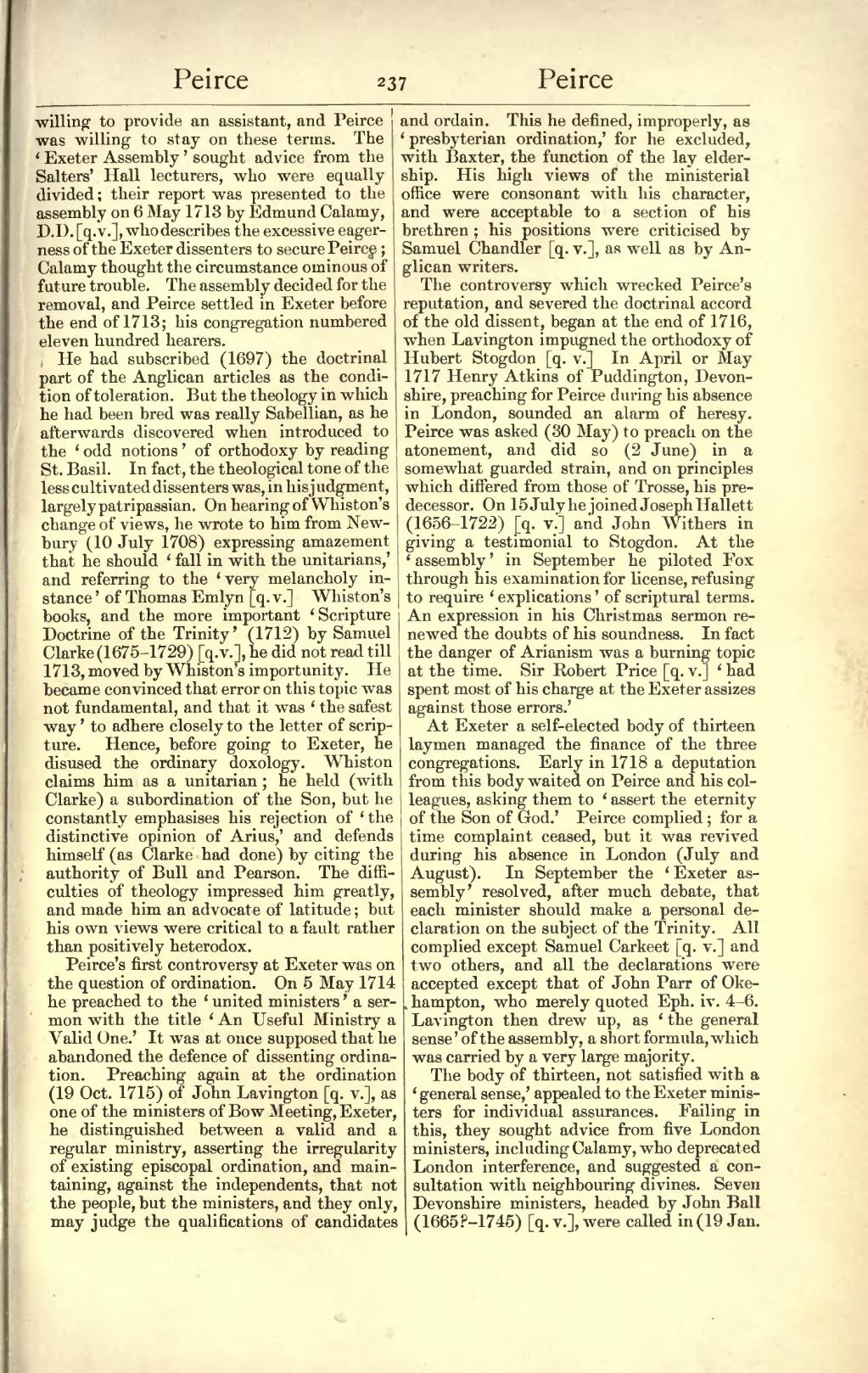willing to provide an assistant, and Peirce was willing to stay on these terms. The ‘Exeter Assembly’ sought advice from the Salters' Hall lecturers, who were equally divided; their report was presented to the assembly on 6 May 1713 by Edmund Calamy, D.D. [q. v.], who describes the excessive eagerness of the Exeter dissenters to secure Peirce; Calamy thought the circumstance ominous of future trouble. The assembly decided for the removal, and Peirce settled in Exeter before the end of 1713; his congregation numbered eleven hundred hearers.
He had subscribed (1697) the doctrinal part of the Anglican articles as the condition of toleration. But the theology in which he had been bred was really Sabellian, as he afterwards discovered when introduced to the ‘odd notions’ of orthodoxy by reading St. Basil. In fact, the theological tone of the less cultivated dissenters was, in his judgment, largely patripassian. On hearing of Whiston's change of views, he wrote to him from Newbury (10 July 1708) expressing amazement that he should ‘fall in with the unitarians,’ and referring to the ‘very melancholy instance’ of Thomas Emlyn [q. v.]. Whiston's books, and the more important ‘Scripture Doctrine of the Trinity’ (1712) by Samuel Clarke (1675–1729) [q. v.], he did not read till 1713, moved by Whiston's importunity. He became convinced that error on this topic was not fundamental, and that it was ‘the safest way’ to adhere closely to the letter of scripture. Hence, before going to Exeter, he disused the ordinary doxology. Whiston claims him as a unitarian; he held (with Clarke) a subordination of the Son, but he constantly emphasises his rejection of ‘the distinctive opinion of Arius,’ and defends himself (as Clarke had done) by citing the authority of Bull and Pearson. The difficulties of theology impressed him greatly, and made him an advocate of latitude; but his own views were critical to a fault rather than positively heterodox.
Peirce's first controversy at Exeter was on the question of ordination. On 5 May 1714 he preached to the ‘united ministers’ a sermon with the title ‘An Useful Ministry a Valid One.’ It was at once supposed that he abandoned the defence of dissenting ordination. Preaching again at the ordination (19 Oct. 1715) of John Lavington [q. v.], as one of the ministers of Bow Meeting, Exeter, he distinguished between a valid and a regular ministry, asserting the irregularity of existing episcopal ordination, and maintaining, against the independents, that not the people, but the ministers, and they only, may judge the qualifications of candidates and ordain. This he defined, improperly, as ‘presbyterian ordination,’ for he excluded, with Baxter, the function of the lay eldership. His high views of the ministerial office were consonant with his character, and were acceptable to a section of his brethren; his positions were criticised by Samuel Chandler [q. v.], as well as by Anglican writers.
The controversy which wrecked Peirce's reputation, and severed the doctrinal accord of the old dissent, began at the end of 1716, when Lavington impugned the orthodoxy of Hubert Stogdon [q. v.] In April or May 1717 Henry Atkins of Puddington, Devonshire, preaching for Peirce during his absence in London, sounded an alarm of heresy. Peirce was asked (30 May) to preach on the atonement, and did so (2 June) in a somewhat guarded strain, and on principles which differed from those of Trosse, his predecessor. On 15 July he joined Joseph Hallett (1656–1722) [q. v.] and John Withers in giving a testimonial to Stogdon. At the ‘assembly’ in September he piloted Fox through his examination for license, refusing to require ‘explications’ of scriptural terms. An expression in his Christmas sermon renewed the doubts of his soundness. In fact the danger of Arianism was a burning topic at the time. Sir Robert Price [q. v.] ‘had spent most of his charge at the Exeter assizes against those errors.’
At Exeter a self-elected body of thirteen laymen managed the finance of the three congregations. Early in 1718 a deputation from this body waited on Peirce and his colleagues, asking them to ‘assert the eternity of the Son of God.’ Peirce complied; for a time complaint ceased, but it was revived during his absence in London (July and August). In September the ‘Exeter assembly’ resolved, after much debate, that each minister should make a personal declaration on the subject of the Trinity. All complied except Samuel Carkeet [q. v.] and two others, and all the declarations were accepted except that of John Parr of Okehampton, who merely quoted Eph. iv. 4–6. Lavington then drew up, as ‘the general sense’ of the assembly, a short formula, which was carried by a very large majority.
The body of thirteen, not satisfied with a ‘general sense,’ appealed to the Exeter ministers for individual assurances. Failing in this, they sought advice from five London ministers, including Calamy, who deprecated London interference, and suggested a consultation with neighbouring divines. Seven Devonshire ministers, headed by John Ball (1665?–1745) [q. v.], were called in (19 Jan.
